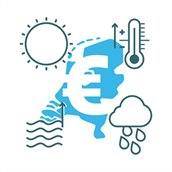Promoting and facilitating
Climate adaptation is to become a standard element in the spatial planning of towns and cities, villages, and rural areas. This requires commitment on the part of a wide range of public and private parties. One of the ambitions in this respect is the optimum exchange of knowledge, tools, and experience. This obviates the need for everyone to reinvent the wheel and enables us to expedite climate adaptation. The Delta Plan for Spatial Adaptation is supporting the efforts under its “Promotion and Facilitation” ambition. This page sets out how the national government is promoting climate adaptation and supporting the parties in their efforts.
LIFE-IP Climate adaptation
A Dutch programme aimed at expediting the implementation of adaptation measures is running from 2022 up to and including 2027. This programme – LIFE-IP Climate Adaptation – is being carried out by a consortium of twenty-two government bodies and organisations. The programme received an EU grant of close to 10 million euros, and the consortium is contributing another 7 million euros. Coordination of the programme is in the hands of the Dutch Ministry of Infrastructure and Water Management along with the National Institute for Public Health and the Environment (RIVM). The LIFE-IP Climate Adaptation page provides more information, including news releases and details on the various LIFE-IP projects.
Knowledge development and knowledge exchange
Government bodies and other parties can share knowledge via this knowledge portal and via the Climate-proof Together network. Furthermore, the Delta Programme for Spatial Adaptation set up the Climate-proof Cities focus area, in conjunction with the Dutch Foundation for Applied Water Research (STOWA) and Deltares research institute. This was one of the fourteen focus areas of the Dutch National Water and Climate Knowledge and Innovation Programme (NKWK), and aimed to support cities in the development and exchange of knowledge on climate adaptation. The Ministry of Infrastructure and Water Management has funded a major part of the studies. In addition, the Public Space City Deal ran from 2021 to 2024: a deal between nine cities, various research institutes, and two Ministries. The participating parties together developed a strategy for integrating urban tasks for climate adaptation, the energy transition, shared mobility, the circular economy, and healthy, nature inclusive cities.
Climate Adaptation Incentive Scheme
Until 31 December 2023, municipalities, provinces and district water boards could apply for a government grant under the Climate Adaptation Incentive Scheme (in Dutch). This scheme was intended to give impetus to climate adaptation. The grants could be used to accelerate the implementation of adaptation measures, to extend spatial planning efforts that had already been scheduled to include adaptation measures, or to engage in new adaptation measures. The Incentive Scheme was launched on 1 January 2021 and will run until 2027.
Administrative Agreement on Climate Adaptation
In November 2018, municipalities, district water boards, provinces, and the national government entered into the Administrative Agreement on Climate Adaptation. Under this Agreement, the national government allocated 300 million euros to climate-proofing the Netherlands. The Agreement also stipulated that all the Dutch municipalities, district water boards, and provinces would map out their climate adaptation tasks and measures by the end of 2020. To support them in the pursuit of this goal, the Minister of Infrastructure and Water Management made additional funds available for 2019 and 2020: a total of 20 million euros. This sum was intended to provide support for carrying out stress tests, risk dialogues, and implementation agendas; for conducting implementation pilots and financial incentive pilots; and for fostering knowledge development and knowledge exchange.
Other completed projects, deals, and meetings
Below is a list of completed incentive projects, concluded deals, and meetings to which the national government has contributed.
- Impact projects between 2015 and 2020: the Spatial Adaptation Incentive Programme supported and funded twenty-three projects that could serve as a model to other parties.
- Climate Adaptation City Deal (in Dutch): a collaboration between thirty-seven partners, among which ten cities. The Deal ran from early 2016 to early 2021.
- Living Labs: the Delta Programme for Spatial Adaptation has supported various living labs. In a living lab, public and private parties, including residents, collectively explore innovative solutions to societal issues. This process is also referred to as co-creation.
- Declaration of Intent and Spatial Adaptation Deals: more than one hundred organisations have signed the Spatial Adaptation Declaration of Intent, and a good eleven Spatial Adaptation Deals have been concluded.
- The Meetings page lists the meetings that were organised under the Spatial Adaptation Incentive Programme.
